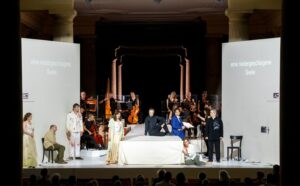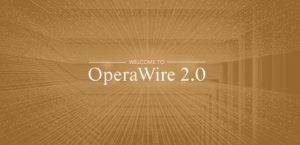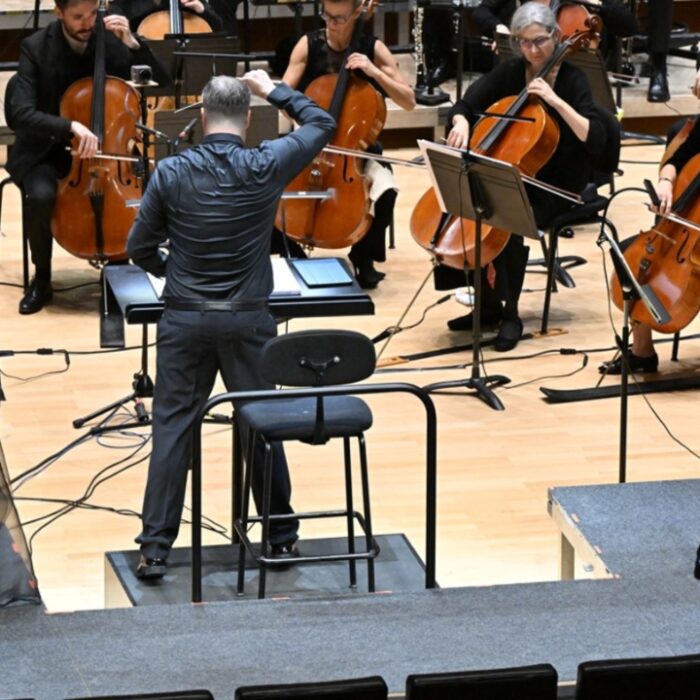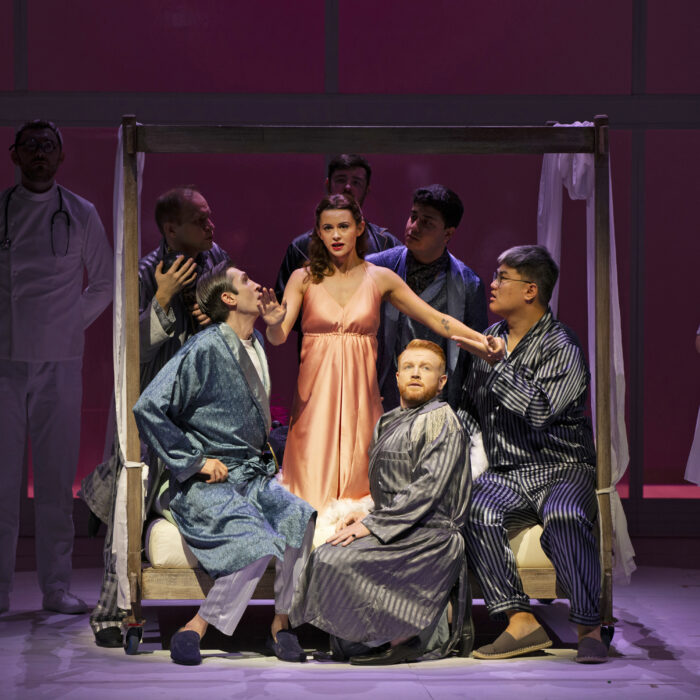
Musikfestspiele Potsdam Sanssouci 2025 Review: Orlando generoso
Director Jean Renshaw’s Revival of Steffani’s Three-Act Opera Is a Tempest of Emotion in a Minimalist Space
By Mengguang Huang(Photo: Stefan Gloede)
The three-act opera “Orlando generoso” by Agostino Steffani, conducted by Dorothee Oberlinger and performed by Ensemble 1700 with an outstanding cast, shone as one of the highlights of the 2025 Musikfestspiele Potsdam Sanssouci.
Premiered in 1691 in Hanover, the opera adapts a segment of Ludovico Ariosto’s “Orlando Furioso.” It is set in a fantasy version of China, where the knight Orlando gradually descends into madness after falling in love with Angelica, daughter of King Galafro. the opera’s intricate web of love, mental turmoil, and theatrical illusions made it a paradigm of early “psychological opera” in its time. Steffani—a multifaceted figure performing clerical duties, diplomacy, and composition—crafted eight operas for Hanover, with “Orlando generoso” standing out for its dense psychological portrayal. Musically, the composer fused the melodic allure of Italian style with the formal precision of French tradition.
This Potsdam revival bravely embraced the challenges posed by its unconventional venue. Due to renovation work at the usual Neues Palais theatre, performances moved to the Orangery Palace (Orangerieschloss), originally a winter garden for exotic plants. Its grand central axis and colonnaded hall were cleverly adapted as a performance space—a seemingly endless colonnaded corridor running through the building’s core—the staging places the orchestra on raised stepped platforms in the middle of the long gallery and the singers perform around or on a partially elevated central thrust stage. Dorothee Oberlinger stood to one side, establishing an open triadic interaction between conductor, singers, and musicians. The set was minimalistic: two white walls arranged at an angle, each with a door marked in Chinese characters for “Entrance” and “Exit,” evoking the opera’s imagined Chinese setting. The Orangery’s classical columns plus soft ambient lighting supports the scene with dramatic perspective lines, creating the illusion of infinite behind the orchestra platform.
The acoustic results were surprisingly gratifying, at least heard from the front rows. Every word of the soloists’ voice and orchestral detail can be heard distinctly. At times, ambient birdsong from the nearby Sanssouci gardens faintly drifted in, adding an unexpected poetic layer.
One might sense that the opera’s original plot set in Chinese court could have resonated more with the festival’s Grand Tour theme of travel, otherness, and cultural encounters, however this minimalist, intimate stage layout did not suggest much in this aspect, but rather naturally spotlighted the singers’ vocal and dramatic artistry. Director Jean Renshaw adopted a psychologically realistic approach, demanding deep character immersion from the performers.
Terry Wey’s Orlando was the emotional centrepiece of the production. Dressed in an olive military uniform, Wey’s portrayal was in favor of nuanced shifts—from rationality to self-doubt, hallucination to breakdown, and finally to reflective calm. His transitions between lyrical arias and intense outbursts were seamless. In Act One where Orlando confronts Angelica’s betrayal, was a gripping eruption of anguish devoid of exaggeration. The lengthy recitative and aria “Pupille sfortunate” showcased Wey’s excellent breath control as he vividly conveyed Orlando’s confusion, hope, and rage. By Act Three, his quiet, almost whispered acceptance was profoundly moving.
Hélène Walter’s Angelica brought flexibility and subtlety to a complex role. A standout moment was her Act Two duet with Ruggiero, accompanied separately by violin and bassoon (Angelica) and oboe and cello (Ruggiero), before merging into a fraught, nuanced exchange that juxtaposed restraint and desire.
Natalia Kawalek’s Medoro offered a warm, tender tone, his lower social status underscored by a gentle but unwavering vocal presence. The lovers’ opening Act One scenes burst with intensity and kinetic energy, their rapid costume exchange and brisk stage movements conveying emotional urgency.
Shira Patchornik’s Bradamante impressed with a penetrating voice and commanding stage presence, conveying anger and passion without descending into shouting. Morten Grove Frandsen’s Ruggiero contrasted with a bright, slightly melancholic falsetto, depicting a hesitant but emotionally vulnerable knight. Their intimate duets evoked echoes of Monteverdi, blending refinement with emotional heat.
Sreten Manojlovic’s Atlante dominated the narrative flow as a calculating, enigmatic sorcerer, whose cold, mischievous stage presence and resonant voice underscored his almost omniscient role in manipulating events.
Gabriel Diaz’s Galafro was a proud, domineering king whose attempts to control others ultimately left him isolated on stage, a portrayal of loss and authority carried with gravitas.
Under Oberlinger’s baton, Ensemble 1700 demonstrated a near-perfect understanding of Steffani’s idiom, effortlessly switching between the French-style dance passages and demanding Italian arias. And their presence also took active part in the staging, during Orlando’s deranged monologue just before the intermission, musicians gradually exited until only a lone lute remained, poignantly underscoring the protagonist’s unraveling psyche.
The choreography, performed by Dancers Martin Dvořák and Katharina Wiedenhofer , also deepened the dramatic fabric. Dressed in black costumes adorned with Chinese characters, they transformed those French dance passages into a full-fledged theatrical language. Their energetic or even aggressive movements evoked the underlying violence within the narrative and provided a striking contrast to the otherwise Steffani’s highly-polished and intellectually controlled music.
In summary, this production of Orlando generoso smartly overcame the challenges of an unconventional venue through a cost-effective staging. The arrangement amplified the singers’ vocal and dramatic expression, making their voices and performances the true protagonists. The delicate balance between music and theatre, body and psyche achieved here resonated deeply with the audience. One can only hope that this carefully conceived production could be heard elsewhere, as it compellingly demonstrates how even modest, quasi semi-staged approaches can be both theatrically and emotionally captivating.



